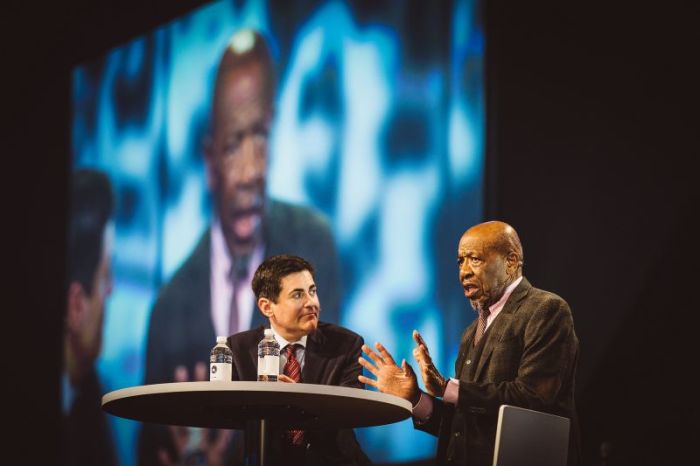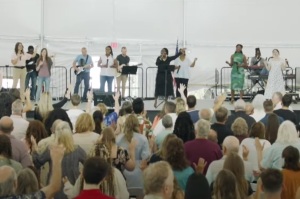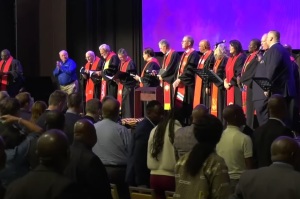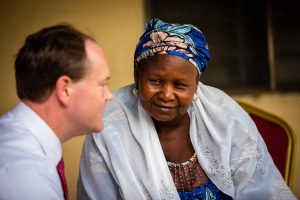Calling a White Man a Racist Is Like Calling Me a N***er, John Perkins Says

Reflecting on the civil rights movement 50 years after the death of Martin Luther King Jr., Bible teacher and civil rights activist John Perkins gave the evangelical church low marks on racial reconciliation and said calling a white man a racist is just like calling him the N-word.
"We are locked captive to our culture. And we are now yelling at each other ... When I call a white man a racist, it's just like calling me a n***er and what we are doing today, we're just saying n***er, n***er, n***er. We can't go on. What we've got in front of us is genocide and suicide and drug addiction because the contradiction is too much to live with. We gotta go back and believe the Gospel," Perkins said in a message to black and white churches.
The 87-year-old made the remarks Tuesday during a conversation with Russell Moore, president of the Southern Baptist Convention's Ethics & Religious Liberty Commission, at a conference billed "MLK50: Gospel Reflections From the Mountaintop" in Memphis, Tennessee. It was jointly organized by the ERLC and The Gospel Coalition and ends on Wednesday.
Perkins, whose new book One Blood: Parting Words to the Church on Race was released on Tuesday, drummed a message from his book that racism won't end in America until the church is reconciled first and the time is right to do that now.
"I just told you what 'One Blood' is about. You can no longer issue out dignity by amendments and programs. Programs should come out of the reflection of who we are before God. That don't affirm our dignity. It keeps the rich feeling that they are still superior in life," he insisted.
"We can't go forward anymore without that (the Gospel). It's genocide. White folks are killing each other in theaters, churches, and we as black folks are killing each other with handguns. We are on a genocide mission because we have believed a lie. We have believed that [there is] more than one human race and we have locked that human race in all of our cultures," he explained.
Perkins noted that when he became a Christian, one of the privileges he had was the experience of being discipled by a multicultural group of Christians. He lamented, however, that the church wasn't doing a good job of discipling today and it had resulted in the identity crisis modern-day American Christians now face.
"We don't like equality. We want to be first and so sin is made up out of our own temptation. The lust of the flesh, the lust of the eye and the pride of life. And the pride of life makes me and my race and your race. It's only one race and that's the human race," he said.
He noted that the enduring racial divide in the church isn't biblical because the early church embraced multiculturalism.
"They called them Christian when the Gospel burnt through the ethnicity at Antioch and it was churches there, it was people there that reflected in the church, the ethnicity of God's human race," said Perkins.
Instead of adding value to humanity, the divide in the church has resulted in the devaluing of life.
"The world is seeing that and they are seeing it within the evangelical church because we have divided it wrong along culture barriers in life. And we wrapped ourselves around our political and social wraparound and we can't penetrate through that culture without offending each other. What state you from, whether you're a Democrat, Republican, Conservative, Tea Party? And we think that brings value to humanity. It devalues humanity," Perkins noted.
"The Gospel is the power of God that brings salvation ... The problem is that we're divided. And reconciliation is not a side issue that we discovered 25 years ago in Promise Keeper. Now it's an option. Reconciliation is the outcome of the Gospel. God is in Christ reconciling the world unto Himself and has given His Church that ministry. And I got an option? God's truth is not negotiable."
As disciples of Christ, he said, Christians are supposed to be known for their love. If Christians are driven by love, the Bible's message on reconciliation is likely to become more effective.
"We are being more like Jesus when we love each other," he stressed. "By this we make all people know that we are His disciples by love. That is the motivation. Love and justice is a motivation for God's redemption. Why did He come? Because He so loved this life. This one life. I have come that they might have life and we have broken that one life into black lives and white lives and we have demonized that. And what we are doing, I heard it tonight, we are saying to each other n***er, n***er, n***er.
"We go round in a circle and we get back and we don't get to progress. We've got to recognize that the God is in Christ, was in Christ, reconciling the world unto Himself and was given unto the Church."





























